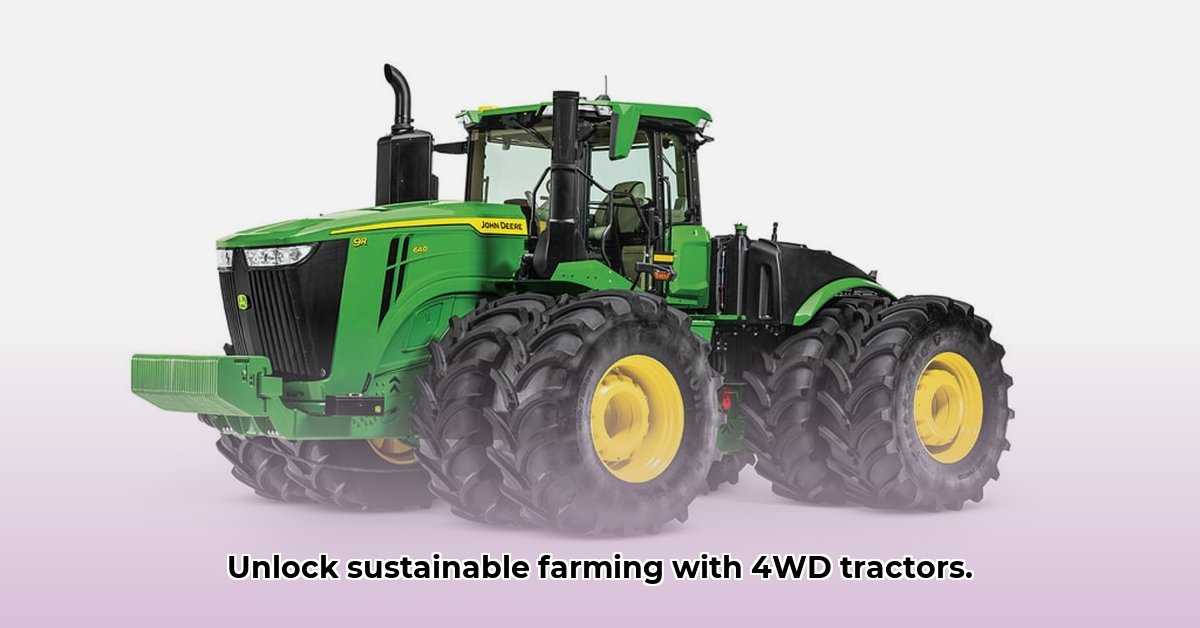
Choosing the right tractor is a crucial decision for any farmer committed to sustainable agriculture. This guide compares four-wheel-drive (4WD) and mechanical front-wheel-drive (MFWD) tractors, focusing on their impact on sustainability, maintenance, and fuel efficiency. Whether you're a seasoned farmer or just starting, this guide will help you choose the tractor that best suits your farm's needs and environmental goals. For more detailed tractor information, check out this helpful resource: tractor specifications.
4WD Tractors: Power and Performance
4WD tractors are known for their exceptional power and traction, making them ideal for challenging conditions like steep hills, heavy soils, and wet fields. This superior grip minimizes wheel slippage, leading to fuel savings and reduced soil compaction – a critical factor in maintaining soil health. Their robust construction ensures longevity, making them a worthwhile investment for heavy-duty tasks. But, this power comes with trade-offs.
"4WD tractors are undoubtedly powerful, but their weight and fuel consumption need careful consideration within a sustainable farming framework," says Dr. Emily Carter, Agricultural Engineering Professor at Cornell University.
However, their higher weight often results in increased soil compaction, a major concern for sustainable practices, particularly in sensitive soil types. Their higher purchase price and increased fuel consumption may offset long-term cost savings. Additionally, their larger size may limit maneuverability in smaller fields. Are the benefits of superior traction in challenging conditions worth the higher initial investment and operational costs?
MFWD Tractors: Efficiency and Maneuverability
MFWD tractors offer a compelling alternative, prioritizing fuel efficiency and maneuverability. Their lighter weight generally causes less soil compaction compared to 4WD tractors, aligning better with sustainable practices. Their agility makes them well-suited for precision farming techniques, allowing for precise implement placement and reduced overlaps. This translates into fuel savings and minimizes environmental impact by reducing input waste. Indeed, many farmers report significant fuel cost reductions over the lifespan of an MFWD tractor.
"The lighter weight and enhanced maneuverability of MFWD tractors are critical for minimizing soil compaction and optimizing input utilization—both key elements of sustainable agriculture," notes John Miller, Sustainable Farming Consultant at the Rodale Institute.
MFWD tractors, however, may struggle in extremely challenging terrain, lacking the raw power of 4WD models for heavy tillage tasks. This makes the choice a careful balancing act between fuel efficiency, soil conservation, and the ability to handle demanding farm work.
Soil Health: A Cornerstone of Sustainable Agriculture
Sustainable agriculture centers around healthy soil. Soil compaction, a consequence of heavy machinery use, significantly reduces water infiltration, nutrient uptake, and overall crop yield. While the exact impact of tractor type on compaction is debated, lighter MFWD tractors generally cause less compaction than their 4WD counterparts, especially on fragile soils. But, remember that proper tire inflation and mindful farming practices are essential regardless of tractor choice.
Choosing Your Tractor: A Practical Guide
Selecting the right tractor depends on several key factors. Consider the following:
| Factor | 4WD Tractor | MFWD Tractor |
|---|---|---|
| Terrain | Excellent for rough terrain | Best for level or gently sloping fields |
| Traction | Superior | Good, but potentially limited in adverse conditions |
| Maneuverability | Less maneuverable | Highly maneuverable |
| Fuel Efficiency | Generally lower | Generally higher |
| Initial Cost | Typically higher | Typically lower |
| Maintenance | Potentially more complex | Generally less complex |
| Best Use Cases | Heavy tillage, steep slopes | Precision agriculture, smaller fields |
Precision Farming and Sustainability
Both 4WD and MFWD tractors can integrate precision farming technologies, such as GPS guidance and variable-rate application. These technologies optimize input use, minimizing environmental impact and improving efficiency. Compatibility with these modern farming techniques should be a key consideration in your tractor choice.
Long-Term Sustainability: The Holistic Approach
Sustainable farming is a holistic system. Your tractor is only one piece of the puzzle. Combining the right tractor with sound soil management, efficient irrigation, and crop rotation maximizes both yield and environmental sustainability.
Key Considerations for Your Decision
Choosing between a 4WD and MFWD tractor is a substantial investment. Carefully evaluate your budget, land characteristics, and farming practices. Consult with experienced farmers and equipment dealers to make an informed choice. The optimal tractor is the one that best aligns with your unique farming operation and long-term sustainability goals.